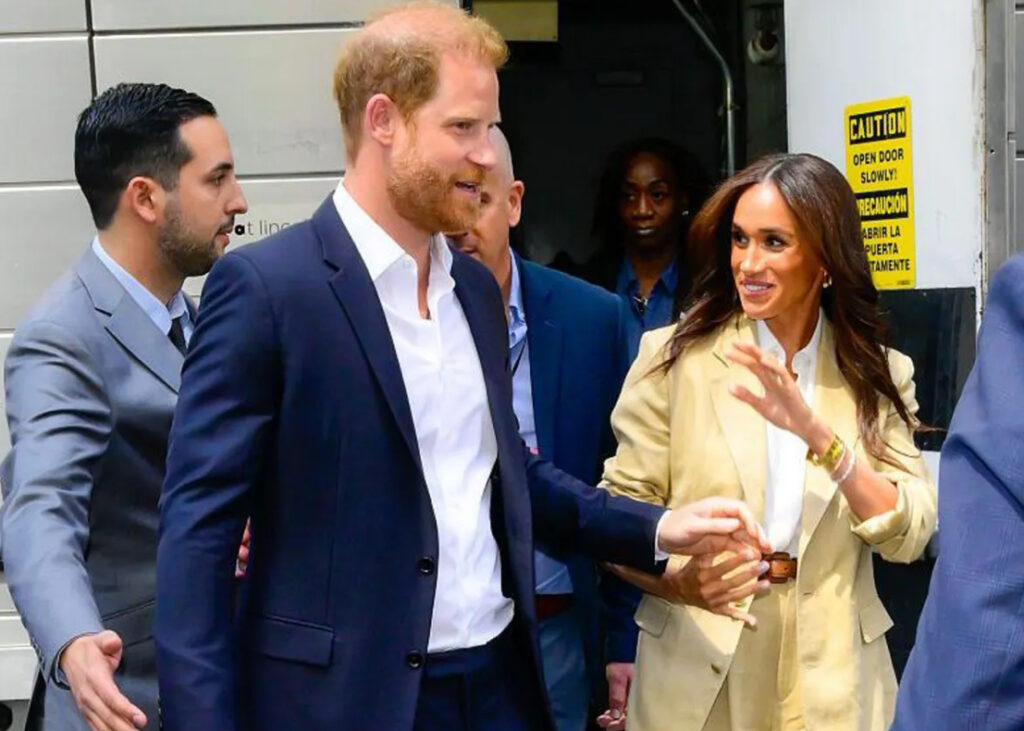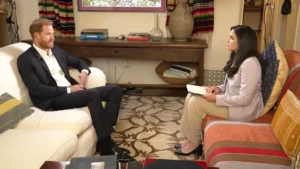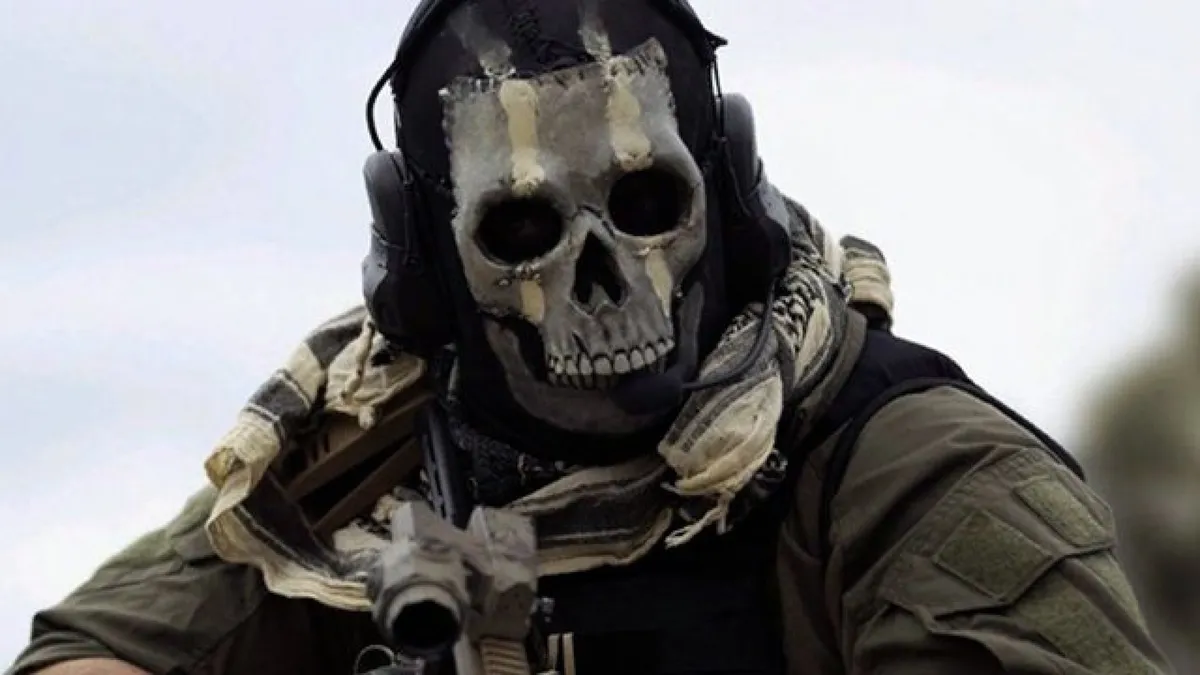In a revealing and emotionally charged interview with the BBC, Prince Harry, the Duke of Sussex, has laid bare the deep ache of estrangement from his family and the unresolved grief that now defines his relationship with the British monarchy. Speaking from his home in California after losing a legal challenge over security arrangements in the UK, Harry did not hide his pain. “I would love a reconciliation,” he admitted, before quietly acknowledging the widening silence between him and his father: “The King won’t speak to me because of this security stuff.”
The conversation—plainspoken, sorrowful, and unflinching—signals a rare public crack in the diplomatic facade that traditionally cloaks royal conflict. But in Harry’s words, there was no trace of strategic posturing. What emerged instead was the voice of a son confronting the passage of time, the sting of rejection, and the heavy price of principled exile.
“I don’t know how much longer my father has,” he said. It was not a threat, not an accusation—but a confession. Of distance. Of mortality. Of time lost to silence.
A Crown Without Shelter: The Security Lawsuit That Reopened Old Wounds
At the center of the Duke’s latest heartbreak is a complex legal battle with the UK Home Office over his right to personal protection while visiting Britain. The case—steeped in constitutional technicality and royal precedent—has become a lightning rod for larger tensions within the House of Windsor.
Prince Harry, who relinquished his status as a working royal in 2020, had hoped to secure the ability to personally fund police protection for himself and his family during visits to the UK. The appeal argued that the risk to his safety, due to both his royal birth and military service in Afghanistan, remained high—and should warrant state-sanctioned protection even in his semi-exile.
But in a decisive ruling, the courts upheld the original decision to deny enhanced protection, stating that Harry’s departure from senior royal duties meant he no longer qualified for publicly funded or even privately arranged police security. In effect, he would not be allowed to buy back the armor he once wore by birthright.
The loss, for Harry, was not merely legal—it was symbolic. It reasserted the line between duty and independence, tradition and reform, loyalty and defiance. And for a man who has fought, by all accounts, to protect his wife and children from the same forces that once consumed his mother, the ruling cut deep.
“Devastated”: A Prince in Exile, A Son Without Access
What Harry voiced in the BBC interview was not fury, but grief. “I’m devastated,” he said—his tone stripped of political calculation. The loss of the case marked not just a defeat in court, but a further fraying of familial ties, as it became clear that this legal battle had poisoned what remained of dialogue between him and King Charles III.
The statement “The King won’t speak to me because of this security stuff” underscores the cruel irony at the pithy of Harry’s dilemma: the very thing he seeks in earnest—safety, reconciliation, home—is the thing that now reinforces his estrangement. His plea for security is heard by the institution as a betrayal. His request for protection is read as rebellion.
And yet, even amid legal rebuke and palace silence, Harry offered an olive branch. “I don’t want to fight any more.” In that statement lies perhaps the most vulnerable line of all. After years of legal filings, memoirs (Spare), documentaries (Harry & Meghan), and transatlantic media storms, here was something quieter: a man asking for peace—not in principle, but in practice.
Time and Blood: The Clock That Can’t Be Turned Back
What makes Harry’s remarks so piercing is not simply their content, but their timing. At 39, the Duke now exists in a space between generations: no longer the rebellious young royal, not yet the elder statesman. With two young children—Prince Archie and Princess Lilibet—growing up without the palace as their backdrop, Harry’s emotional landscape is shifting.
The most haunting admission of the interview came when Harry acknowledged, “I don’t know how much longer my father has.” It was a statement unadorned with sentimentality. But beneath its stoicism lay the great unspoken truth of royal life: dynasties may be built to last, but fathers do not live forever.
For all the politics and public drama, this story is ultimately a private one. A son alienated from his father. A grandson kept distant from his grandfather. A family entangled in centuries of protocol, unable to find each other across the chasm of title and duty.
The Palace Responds, but With Cold Finality
In a brief and pointed statement, Buckingham Palace responded: “All of these issues have been examined repeatedly and meticulously by the courts, with the same conclusion reached on each occasion.”
It was a sentence that felt less like a rebuttal and more like a closing of the door. Legal, sanitized, and sterile—it underscored the institutional wall that now separates Harry from his heritage. While the monarchy insists it has treated the matter with fairness and finality, there is little in their statement to suggest empathy or desire for reconciliation.
For critics of the Palace, the remark will read as tone-deaf. For traditionalists, it will affirm the Crown’s prerogative to operate above sentiment. But for Harry, it likely lands as just one more reminder that the institution he was born into no longer speaks his language—or his pain.
The Weight of Memory: Diana, Ghosts, and the Specter of 1997
Running beneath the surface of Harry’s legal argument—and the emotional force behind his need for protection—is the specter of Princess Diana. His mother died in a Paris car crash in 1997, chased by paparazzi, abandoned by the very systems designed to protect her.
It is no exaggeration to say that Harry’s entire adult life has been shaped by that trauma. His decision to leave royal life, his insistence on mental health advocacy, his wariness of the British press, and now his fight for security—all of it circles back to a single, devastating event.
He has said it before: he does not want history to repeat itself. But it’s clear that history, in the royal institution, does not bend easily.
The Future of Reconciliation: Is the Crown Capable of Change?
What happens now?
With his new legal setback and with Buckingham Palace signaling no intention to revisit the issue, Prince Harry finds himself in emotional and constitutional exile. He remains a prince by title, but not by function. A member of the royal family, but not of the royal institution.
The question of reconciliation now hangs in the air like fog over Windsor. Can a family steeped in duty and discretion ever open itself to public vulnerability? Can a monarchy that survives on continuity absorb the honesty Harry brings?
Perhaps the more telling question is not whether Harry will reconcile with his father and brother—but whether he still believes the institution is capable of reconciliation at all. As of now, he seems to want it. But the clock is ticking.
A Human Story in Royal Clothing
In many ways, this story is not about royalty. It’s about family. About the deep wounds that fester when silence replaces speech. About what happens when legacy stands in for love. It is the story of a man trying to safeguard his children, carry his past, and still find a way back to the place that shaped him.
The Royal Family may consider the case closed. But for Harry, there is no closure—only a father growing older, children growing up, and a past that will not let go.
Either or not the King answers his phone, the call has already been made.
No comments yet.









